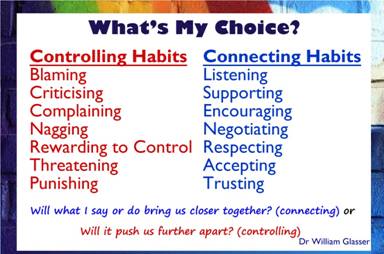
In relationships, our need for love and belonging is the most important one. Based on Glasser, satisfying this specific need will guarantee our ability to fulfill all other needs. The source of all problems in the world, according to the choice theory, is disconnection. Behavior problems, mental illnesses, violence, abuse, crime, school problems, marriage breakdown, relationship challenges, and depression are all a result of our inability to connect or feel love and have a sense of belonging.
Our relationship with those we care about and care for us depends on our caring ability. Glasser suggested that there are 7 deadly habits that needed to be replaced with 7 caring habits.
In the Be Happy in LIFE coaching program, kindness is the ultimate caring act and it replaces fear, which we believe is the ultimate reason for pain and suffering. All the good things we do are an act of love and we show it by kindness. All the “bad” things we do, we do out of fear.
Seven Deadly Habits
Based on the choice theory, there are 7 things we do that cause a relationship breakdown. This is true in all relationships–whether it is with parents, kids, husbands, friends, lovers, siblings, work colleagues, acquaintances, bosses, managers, clients, suppliers, or even strangers we only meet for a short time.
| Seven Caring Habits | Seven Deadly habits |
| Supporting Encouraging Listening Accepting Trusting Respecting Negotiating differences |
Criticizing Blaming Complaining Nagging Threatening Punishing Bribing or rewarding to control |
Check yourself. If you are doing any of the things in this list, you are sabotaging your relationships. Remember, happiness is a choice. A happy relationship is a choice as well. You can always choose differently.
The seven deadly habits are as follows:

- Blaming – For example, blaming your kids for not having time off, for taking away your youth, for getting up at night, for not completing an assignment on time, for making you feel that way.
- Complaining – For example, sharing your discomfort with others nonstop and expressing disappointment and unhappiness.
- Nagging – For example, trying to make someone else do something that you want them to do, when they don’t want to.
- Threatening – Creating fear in someone else. For example, threatening with punishment, disappointment, or possible negative outcome.
- Punishing – For example, no food, no sleep, no friends, physical punishment, and isolation.
- Bribing or rewarding to control – This is a form of manipulation and it goes against the choice muscle. When using this behavior in a relationship, the other person’s only choice is to do it out of fear, which weakens the muscle. For example: “I will give you this if you do this.” It takes away power from the other person.
Seven Caring Habits
As the 7 deadly habits are the cause of all relationship problems, the 7 caring habits are the solution.
- Supporting is the opposite of criticizing – You are supportive when you help the other person achieve what he/she wants to achieve. For example, your wife wants to start dancing. She needs to feel that you will not criticize her for her choice by saying it is better to run around the block if she wants to lose weight.
- Encouraging is the opposite of blaming – You are encouraging when you actively doing something to push the other person gently toward what he wants to achieve. Instead of telling your child that he got a D in math because he was lazy and watched TV too much, it is better to sit with him and help him with some workbooks that he doesn’t know how to do.
- Listening is the opposite of complaining – You are a kind and a good listener when you give your time and ears to the other person. For example, instead of complaining that your employees do not finish the task on time, it is best to listen to what is blocking them from giving it to you on time. The best way to test it is to check in every conversation who speaks the most. The person who speaks less is more caring.
- Accepting is the opposite of nagging – You are kind and accepting when you have no judgment toward anything the other person is doing or not doing and you don’t nag about it. For example, instead of telling your kids to take the bus by themselves, just accept that they are not confident enough to do it. Try again in a month or two.
- Trusting is the opposite behavior to threatening – You are trusting when you believe that this person feels the same. He/she cares the same about you as much as you care for him/her. You can open up to this person and he can open up to you. You don’t think you are in a higher position and use your power to take power from the other person. For example, trusting your partner that he/she is doing the best he/she can without any bad intentions, instead of saying, “I will leave the house if . . .”
- Respecting is the opposite of punishing – Respect is the act of giving a space to the other person to be himself/herself without judgment and without the fear to be themselves. For example, instead of punishing your child for choosing a profession you don’t like, respect his choices to make his/her own choices.
- Negotiating differences is the opposite of bribing or rewarding for control – You are a good negotiator if in conflict you do not fall into the deadly habits and discuss reasonably about your differences. For example, you agree to disagree without hard feeling at the end of it.

Join me next time when I explain how parents can teach their kids the choice theory and why it is important for parents to learn it themselves.
Happy relationship!
Ronit
This post is part of the series Choice Theory:
- Choice Theory: Be Happy in Life
- Choice Theory: Happy Relationships
- Choice Theory: Happy Parenting
- Choice Theory: Happy Business
- Choice Theory: Happy Classrooms
- Choice Theory: Happy Teachers












